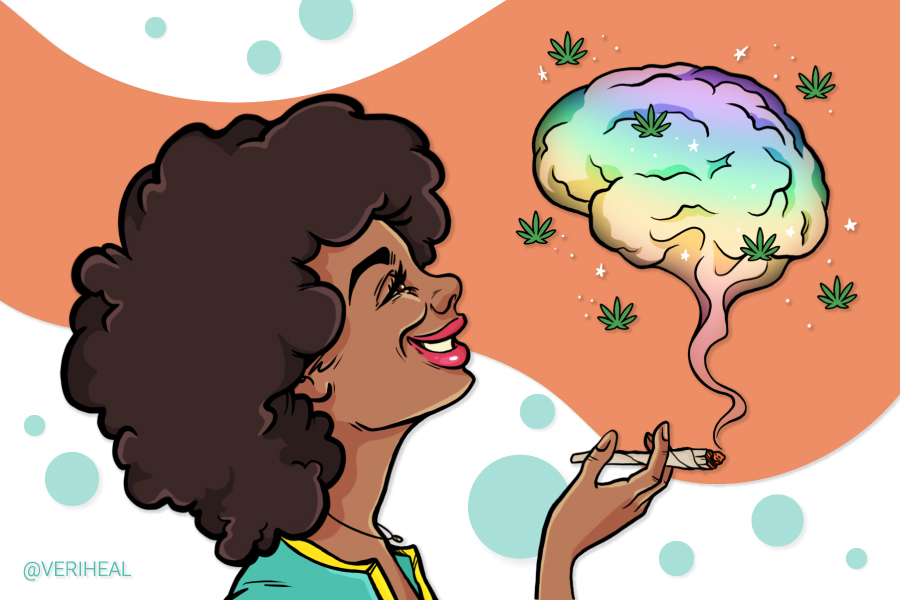THC used to be something that was only referenced when talking about hippies or stoners. Today THC has made its way off the couch and out of basements into medical conversations and scientific observations. THC is the most commonly known member of the cannabinoid family. The abbreviation THC is actually short for the scientific name Delta-9-tetrahydrocannabinol.
THC is largely responsible for the intoxicating effects felt when someone consumes cannabis. Many people refer to Rafael Mechoulam as the grandfather or founder of cannabis. While he played a vital and pivotal role in the understanding and identification of THC, the first individual to receive credit for this was Roger Adams in 1942. Adams was awarded a patent for his particular method of isolating CBD, and Adams was also the first person to identify THC.
Moving on from who gets the credit for THC’s discovery, we watch decades of use and research start to tell a tale of how this widely misunderstood cannabinoid works. For many years people would believe that THC was the culprit found in cannabis that would make people stoned and lazy. Reefer madness had painted a wrongful and stigmatizing picture that stoners were lazy long-haired jobless individuals with no plans or future. However, time would prove to tell a different tale.
What Is THC and What Does It Do?
Delta-9-tetrahydrocannabinol, or THC for short, is one of the intoxicating compounds produced by the cannabis plant. It is one of over 150 phytocannabinoids, or plant-based cannabinoids, found in the cannabis plant. THC and other cannabinoids bind to our endocannabinoid receptors and cause changes in the body’s chemistry.
Different varieties and strains of cannabis have different levels of THC. Some contain virtually little to none, such as specific cultivars of hemp and cannabis strains. But it plays a generally cumulative role in the intensity of the buzz from cannabis. A strain that tests with an average THC level of 11% typically will not be as strong as one testing at 18 or 24%. However, genetic studies have yet to find clear differences between sampled products labeled sativa, indica, or hybrid, meaning there may be inconsistencies in the consumers’ experiences, expectations, and needs (2).
When you see a percentage of THC, it is in reference to the amount of it in a gram of cannabis. If you buy a gram of cannabis testing at 24%, that means that you have 240 mg of THC per gram. Reading “13% THC” would mean 130 mg of THC per gram. However, that doesn’t mean this is exactly how many milligrams you will consume. Some will be lost in heat transfer, and some will go up in smoke.
The THC level of a particular strain of cannabis is an excellent guide for the strength of the strain but shouldn’t be the staple of what you look for in cannabis. There is more to cannabis than just delta-9 THC; there’s delta-8 THC, 11-Hydroxy-THC, and others. We will dive into this together in just a moment, but first, let’s look at some of the reported potential benefits of THC based on early research.
Areas of Potential THC Benefits:
Of course, more research with larger, human subject studies are needed to determine the exact risks and benefits of THC and cannabinoids (4). THC has been associated with more adverse effects than CBD. While CBD is generally recognized as safe by the World Health Organization (WHO), THC, especially smoked or vaporized, may not be suitable for everyone and has not been approved by the FDA for any condition (6). Interested patients should first consult with a qualified healthcare provider. Never self-diagnose or self-treat, and keep in mind there may be other safe and established medication options your healthcare provider may recommend.
Wait, There’s a Delta-8 THC?
Delta-8-tetrahydrocannabinol is relatively new to most people. Delta-8 THC and delta-9-THC have a remarkably similar chemical composition and are only different by an atomic bond or two. Delta-8 is only found in very miniscule amounts in comparison to delta-9. It does, however, have its own unique, intoxicating effect. Some extraction companies produce distillate cartridges rich in delta-8-THC. The buzz is very similar to delta-9 but not quite as strong.
To give you an idea, you can find typical levels of THC or delta-9-THC in cannabis, averaging anywhere from 15 to 30%. It is extremely rare to find any form of cannabis flower containing more than 1% delta-8-THC. To achieve high levels of delta-8-THC, extraction must happen. A product called AquaTek D8 distillate cartridges was tested, having 58% delta-8-THC and only 7.9% delta-9 THC.
Delta-8 may be a pain reliever in terms of what effects it has (7). Many believe that it helps build on delta-9 to intensify the effects. As with most cannabinoids, there isn’t enough known yet specifically about delta-8-THC to state any clear risks or benefits. However, the entourage effect is held in high regard by many who believe it is more effective than isolated cannabinoids such as high THC concentrates—and it is supported by scientific research (8). The entourage effect happens when a wide variety of full spectrum of cannabinoids work synergistically together to produce optimal results. It’s but one of many cannabinoids. There’s cannabidiol (CBD), Cannabinol (CBN), Cannabigerol (CBG), Tetrahydrocannabivarin (THCV), Cannabichromene (CBC), and Cannabidivarin (CBDV) just to name a few.
While cannabis anecdotally works for many, more research is needed into THC and other cannabinoids. While current research is mostly limited to animal and small human studies, hopefully larger studies will better determine the benefits and risks of cannabinoids like THC. For more information on current cannabis research, visit the page here from the National Center for Complementary and Integrative Health.
Author, Share & Comments















